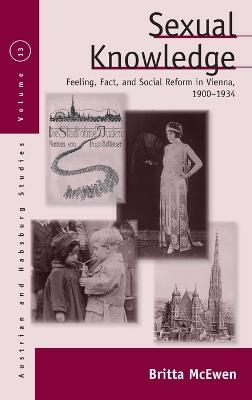
Sexual Knowledge
Feeling, Fact, and Social Reform in Vienna, 1900-1934
Seiten
2012
Berghahn Books (Verlag)
978-0-85745-337-2 (ISBN)
Berghahn Books (Verlag)
978-0-85745-337-2 (ISBN)
Based on rich source material, this book charts cultural changes that are hallmarks of the modern era, such as the rise of the companionate marriage, the role of expert advice in intimate matters, and the body as a source of pleasure and anxiety. These changes are evidence of a dramatic shift in attitudes from a form of scientific inquiry...
Vienna’s unique intellectual, political, and religious traditions had a powerful impact on the transformation of sexual knowledge in the early twentieth century. Whereas turn-of-the-century sexology, as practiced in Vienna as a medical science, sought to classify and heal individuals, during the interwar years, sexual knowledge was employed by a variety of actors to heal the social body: the truncated, diseased, and impoverished population of the newly created Republic of Austria. Based on rich source material, this book charts cultural changes that are hallmarks of the modern era, such as the rise of the companionate marriage, the role of expert advice in intimate matters, and the body as a source of pleasure and anxiety. These changes are evidence of a dramatic shift in attitudes from a form of scientific inquiry largely practiced by medical specialists to a social reform movement led by and intended for a wider audience that included workers, women, and children.
Vienna’s unique intellectual, political, and religious traditions had a powerful impact on the transformation of sexual knowledge in the early twentieth century. Whereas turn-of-the-century sexology, as practiced in Vienna as a medical science, sought to classify and heal individuals, during the interwar years, sexual knowledge was employed by a variety of actors to heal the social body: the truncated, diseased, and impoverished population of the newly created Republic of Austria. Based on rich source material, this book charts cultural changes that are hallmarks of the modern era, such as the rise of the companionate marriage, the role of expert advice in intimate matters, and the body as a source of pleasure and anxiety. These changes are evidence of a dramatic shift in attitudes from a form of scientific inquiry largely practiced by medical specialists to a social reform movement led by and intended for a wider audience that included workers, women, and children.
Britta McEwen teaches European History at Creighton University in Omaha, Nebraska.
Acknowledgements
Introduction: Vienna as Laboratory for Sexual Knowledge
Chapter 1. City Hall and Sexual Hygiene in Red Vienna
Chapter 2. Sexual education debates in Late Imperial and Republican Vienna
Chapter 3. Popular Sexual Knowledge for and about Women
Chapter 4. Clinic Culture
Chapter 5. Emotional Responses: Hugo Bettauer's Vienna Weeklies
Chapter 6. Local Reform on an International Stage: The World League for Sexual Reform in Vienna
Conclusion: Sexual Knowledge between Science and Social Reform
Bibliography
| Erscheint lt. Verlag | 19.3.2012 |
|---|---|
| Reihe/Serie | Austrian and Habsburg Studies |
| Verlagsort | Oxford |
| Sprache | englisch |
| Maße | 152 x 229 mm |
| Gewicht | 472 g |
| Themenwelt | Geisteswissenschaften ► Geschichte ► Regional- / Ländergeschichte |
| Geschichte ► Teilgebiete der Geschichte ► Kulturgeschichte | |
| Sozialwissenschaften ► Soziologie | |
| ISBN-10 | 0-85745-337-8 / 0857453378 |
| ISBN-13 | 978-0-85745-337-2 / 9780857453372 |
| Zustand | Neuware |
| Haben Sie eine Frage zum Produkt? |
Mehr entdecken
aus dem Bereich
aus dem Bereich
der stille Abschied vom bäuerlichen Leben in Deutschland
Buch | Hardcover (2023)
C.H.Beck (Verlag)
23,00 €
vom Mittelalter bis zur Gegenwart
Buch | Softcover (2024)
C.H.Beck (Verlag)
12,00 €


